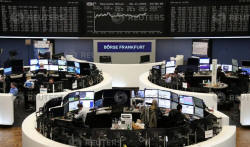Trade tensions pause stocks rally
 Send a link to a friend
Send a link to a friend
 [November 27, 2018]
By Ritvik Carvalho [November 27, 2018]
By Ritvik Carvalho
LONDON (Reuters) - World stock markets
fought to keep a rebound alive on Tuesday after U.S. President Donald
Trump seemed to quash hopes of a trade truce with China, clouding what
had been a bright start to the week.
European markets opened subdued, but dipped as trading progressed, with
the pan-European STOXX 600 benchmark last down 0.4 percent, pulling back
from a one-week high hit in the previous session.
Asian markets put on a brave face, with Japan's Nikkei <.N225> adding
0.64 percent and Chinese blue chips <.CSI300> down 0.1 percent.
MSCI's broadest index of Asia-Pacific shares outside Japan
<.MIAPJ0000PUS> was last up 0.3 percent. E-Mini futures for the S&P 500
<ESc1> dipped 0.3 percent, indicating a lower open on Wall Street.
The MSCI All-Country World Index <.MIWD00000PUS>, which tracks shares in
47 countries, was flat on the day.
In an interview with the Wall Street Journal, Trump said he expects to
raise tariffs on $200 billion in Chinese imports to 25 percent from 10
percent currently. He said it was "highly unlikely" he would accept
China's request to hold off on the increase, planned for Jan. 1.

The comments ran counter to recent speculation about a possible deal
when Trump meets Chinese President Xi Jinping at the G20 summit in
Buenos Aires later this week.
"The upcoming meeting between Trump and Xi is pivotal going into the
year-end and for the outlook for global growth, which has shown signs of
slowing," said Lee Hardman, a currency analyst at MUFG in London.
"If there's no breakthrough, that makes it more likely that more tariffs
will be imposed, and that increases downside risks to trade."
The news initially put trade-sensitive currencies, including the
Australian dollar <AUD=D3>, on the defensive, although it climbed back
into positive territory in European trade. The dollar was flat against
the yen at 113.585 <JPY=EBS>
The index that measures the dollar against a basket of other currencies
<.DXY> was up 0.1 percent. [FRX/]
Sterling was weaker across the board after Trump said on Monday the
agreement allowing the United Kingdom to leave the European Union may
make trade between Washington and London more difficult. [GBP/]
"We are seeing a greater degree of stability in sterling, but it went
below recent ranges on Trump's comments," said Neil Mellor, currency
strategist at Bank of New York Mellon in London. "Those remarks do not
tell us anything we didn't know already but the market is trading on
headlines at the moment."
[to top of second column] |

The German share price index DAX graph is pictured at the stock
exchange in Frankfurt, Germany, November 26, 2018. REUTERS/Staff

The euro edged lower to $1.13235 <EUR=>.
OIL SHIFTS RISKS ON INFLATION, FED
Shares in Apple Inc <AAPL.O> fell after hours in reaction to Trump's comments
that tariffs could also be placed on laptops and iPhones imported from China.
Trump's remarks came just as the mood among investors had shown signs of
brightening and Wall Street took heart from an upbeat holiday shopping period.
The Dow <.DJI> had ended Monday up 1.46 percent, the S&P 500 <.SPX> gained 1.55
percent and the Nasdaq <.IXIC> 2.06 percent.
The rally came after the S&P 500 on Friday recorded its lowest close in six
months, down more than 10 percent from September's peaks and back in
"correction" territory.
In commodity markets, oil prices steadied, depressed by record Saudi Arabian
production but supported by expectations that oil exporters would agree to
output cuts at an OPEC meeting next week.
U.S. crude <CLc1> was up 0.1 percent at $51.68 a barrel, while Brent <LCOc1>
futures rose 0.2 percent to $60.60.
Analysts at National Australia Bank noted the 30 percent drop in oil since early
October would drag on U.S. inflation in coming months, perhaps offering further
reason for the Federal Reserve to go slower on tightening.
"This is a starkly different picture to just a few months ago," said NAB's
market strategist Tapas Strickland. "A stable to lower inflation outlook means
there is no urgency for the Fed to hike rates. An early 2019 pause is thus
becoming more probable."
The futures market <0#FF:> has already shifted to imply two more hikes at most
next year. The Fed itself is predicting three, and more in 2020.

Hints on rate moves may come from Fed Vice Chairman Richard Clarida, who speaks
later on Tuesday, and Chair Jerome Powell, who will make an appearance the day
after.
(Reporting by Ritvik Carvalho; additional reporting by Dhara Ranasinghe in Lonon
and Wayne Cole in Sydney; editing by Larry King and Angus MacSwan)
[© 2018 Thomson Reuters. All rights
reserved.] Copyright 2018 Reuters. All rights reserved. This material may not be published,
broadcast, rewritten or redistributed.
Thompson Reuters is solely responsible for this content. |